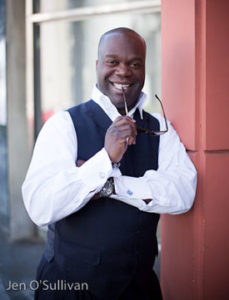
Author and motivational speaker Simon T. Bailey has some advice for how campus leaders can thrive in an era marked by rapid change and disruptive technologies: Focus on people, process, and problems.
Bailey was the opening keynote speaker at the 40th annual conference of the Association for Information Communications Technology Professionals in Higher Education (ACUTA), held in Orlando April 3-6. The conference brought together nearly 300 campus technology specialists from across North America to learn about the latest trends and new developments in delivering voice, video, and data services to higher-education stakeholders.
The theme for this year’s conference, “Succeeding in the New Reality,” was a nod to the many challenges facing colleges and universities today, including cuts in federal and state education funding that make it harder to invest in campus IT infrastructure—as well as the accelerating pace of change in education and technology. And it was this latter challenge that Bailey’s keynote sought to address.
Too often in times of rapid change, an organization’s leaders tend to focus on the technologies that are causing the disruption, Bailey said—when they should be paying attention to their employees first and foremost.
“We can’t forget people in the midst of a shift,” he said. “Organizations don’t have ideas—people do.”
People often feel overwhelmed by change because they are emotionally connected to the past and to the old way of doing things, Bailey said. To be a successful leader in times of change, you have to make sure your employees are working in an environment where they feel supported enough to be creative—and that means getting them comfortable with adapting to change.
One way to do this is to listen instead of hear.
“I know you’re busy, but take five minutes a day to really connect with someone on your staff,” Bailey said. “People don’t care how much you know until they know how much you care.”
Ask employees about their concerns, and make sure they know you’re listening to them by repeating what they’ve said back to them. That will help them realize, “hey, he really gets me,” Bailey said.
Also, don’t be sparing with praise. “Brilliance manifests itself when people are in an environment that celebrates them rather than tolerates them,” he said.
Change is easier to accept when it’s something that we lead, instead if something that is done to us. So ask your employees for feedback, and empower your staff to make suggestions.
To inspire innovation, Bailey suggested a process known as “stop, start, continue.” In staff meetings, ask: What are the things we should continue to do? (These are the things you’re already doing well as an organization.) What are the things we should start doing that we haven’t done before? And finally, what are the things we should stop doing—things that no longer make good business sense?
This process can help lead to a state of “vuja de”—a term that Bailey borrowed from the late comedian George Carlin, meaning the opposite of déjà vu. If déjà vu is the feeling of “been there, done that,” then vuja de is a feeling of “going there, doing that,” Bailey said.
In other words, it’s the ability to see what everyone else sees, but understand it differently—to experience the future in the present.
The innovation you bring about through this process should focus on meeting needs or solving problems that aren’t currently being addressed within your organization or within education at large, Bailey said.
“In the future, we will be paid for the problems we solve and the solutions we find, not just the products and services we provide,” he said, adding that most products and services ultimately can be outsourced.
To focus on problem solving, ask these three questions, Bailey said: What’s the need? What’s the want? What’s your story?
The answers to these questions will point to an end result that “brings about the shift that allows us to be relevant,” he said.
As an example, he cited High Point University, a private liberal arts school in High Point, N.C., affiliated with the United Methodist Church. High Point competes with Emory and other Methodist universities for students, and campus leaders wanted to make the school more attractive to prospects.
To solve this problem, High Point’s leaders developed a strategy that focuses on enhancing the student experience, in effect treating students like business customers. For instance, they created a concierge service for students that provides wake-up calls so undergrads aren’t late for class, as well as free movie nights complete with popcorn.
As a result of this plan, High Point has become much more attractive to prospective students in the last five years, and more alumni want to contribute financially to the university because of the experience they had on campus.
By focusing on students’ needs and wants, High Point officials “are rewriting their story” successfully, Bailey said.
- Extron AV Switching, Streaming, and Control Systems Aid Higher Learning at Idaho’s First Medical School - June 1, 2021
- Extron XTP, Streaming, and Control Systems Empower Point Park University’s Varsity Esports Program - June 1, 2021
- Extron NAV Series Delivers AVoIP Throughout Allied Health Veterans Hall at UNC Wilmington - June 1, 2021
